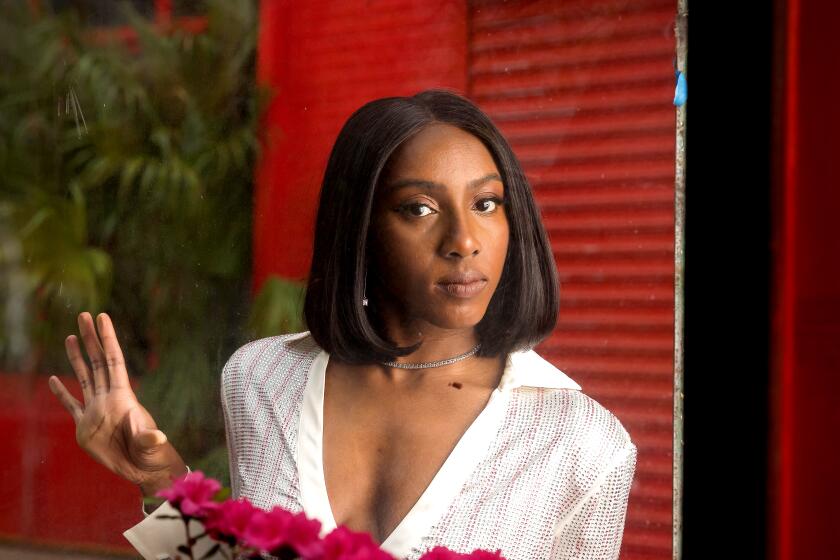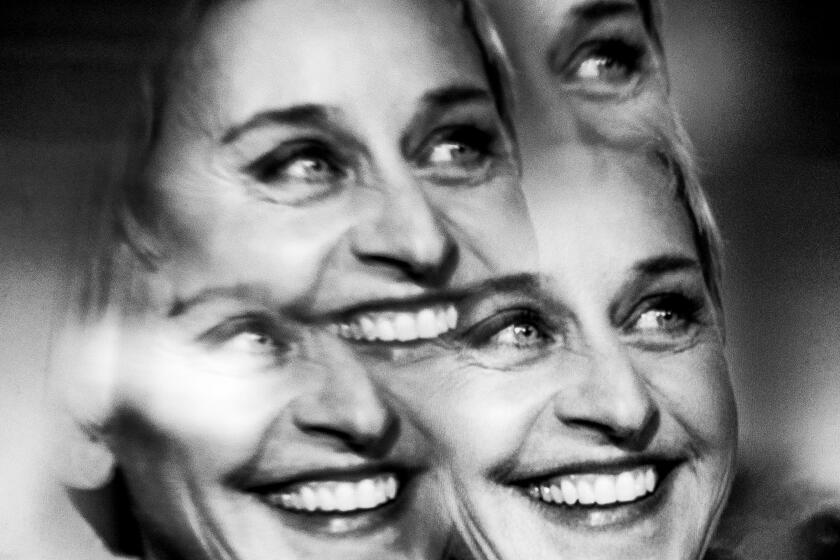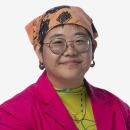How Ziwe became your ‘Black Friend,’ and why she’d rather be loved than feared
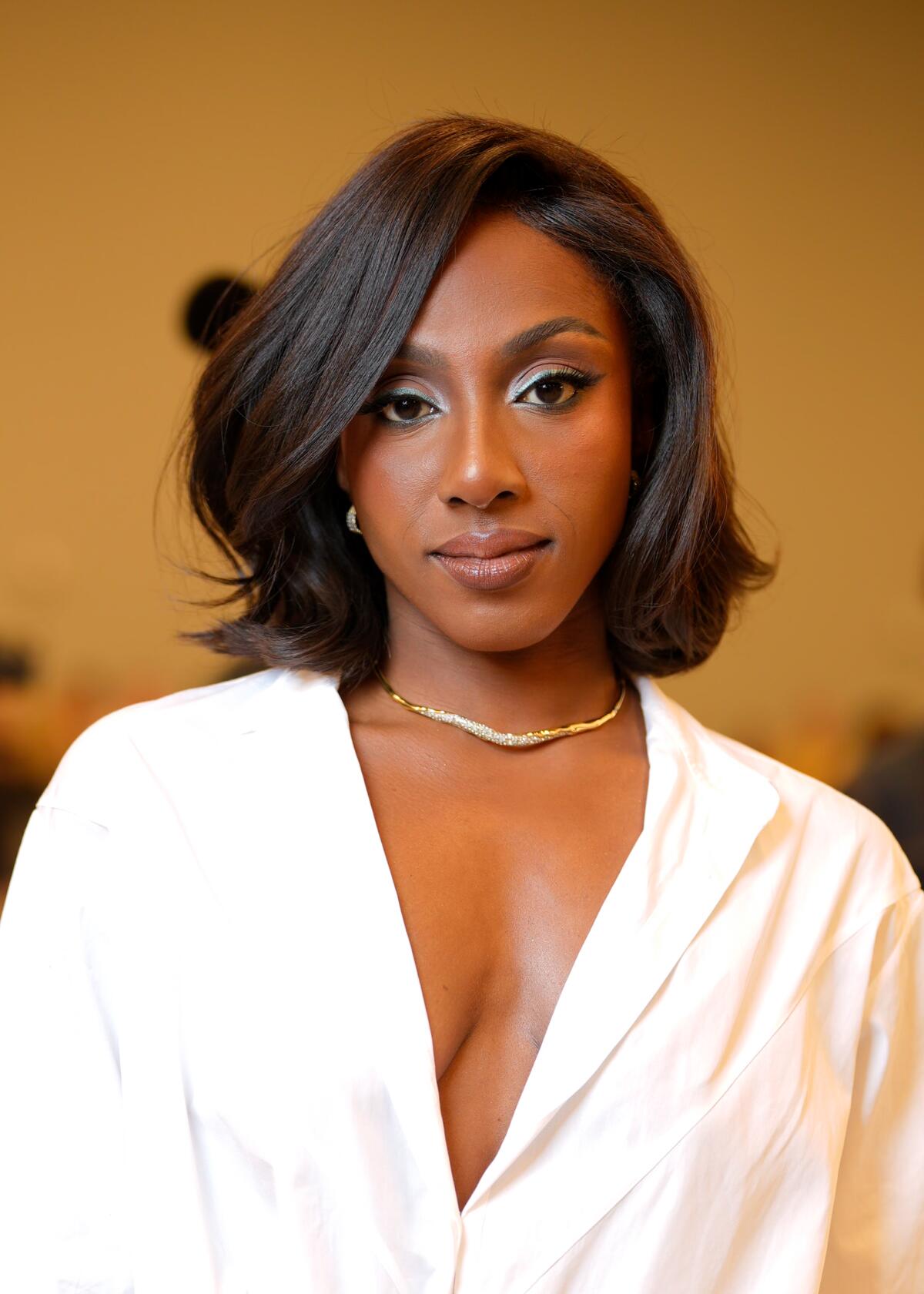
- Share via
On the Shelf
Black Friend: Essays
By Ziwe
Abrams: 192 pages, $26
If you buy books linked on our site, The Times may earn a commission from Bookshop.org, whose fees support independent bookstores.
On Ziwe’s eponymous late-night talk show, which Showtime tragically canceled earlier this year, everything was carefully curated: the cartoonish graphics, the confrontational style, the contrast of the gaudy pink set with Ziwe Fumudoh’s knack for leaping into cringe and controversy with questions like: How many Black friends do you have?
But in her first book of essays, “Black Friend,” out this week, the writer-comedian plays Bad Cop with herself on topics ranging from her Nigerian immigrant upbringing to the impact of fame on body image, and the result feels unrehearsed. Though her terse acknowledgments section (in its entirety: “Thank you”) feels very Ziwe, an essay titled “Wikifeet” veers from jokes about foot fetishists to memories of growing up “an ugly duckling.” Throughout, Ziwe toggles between sincerity and absurdity, personal anecdotes and ample footnotes, in search of a subject much harder to pin down than dumbfounded Chet Hanks or blasé Julia Fox.
Known for her frank, funny conversations about sensitive issues, especially race, Ziwe prepares for her next act: shaking up hidebound, male-dominated late-night TV.
“It’s not in my impulse to share things with strangers,” she told The Times during a Zoom interview from New York earlier this month. “The editing process for me was excavating where I personally stood and what my perspective was.”
The title of her book is a nod to the viral Instagram Live interviews that inspired her talk show, in which her “Black friends” question played on the clichéd defense of white people called out for racism. But it’s also a reclamation of her own centrality in the narrative, as she tells the story of how she went from sidekick to star.
Our conversation — about her foray into books, how she differs from her persona and what it means to be a “Black friend” — has been edited for clarity and length.
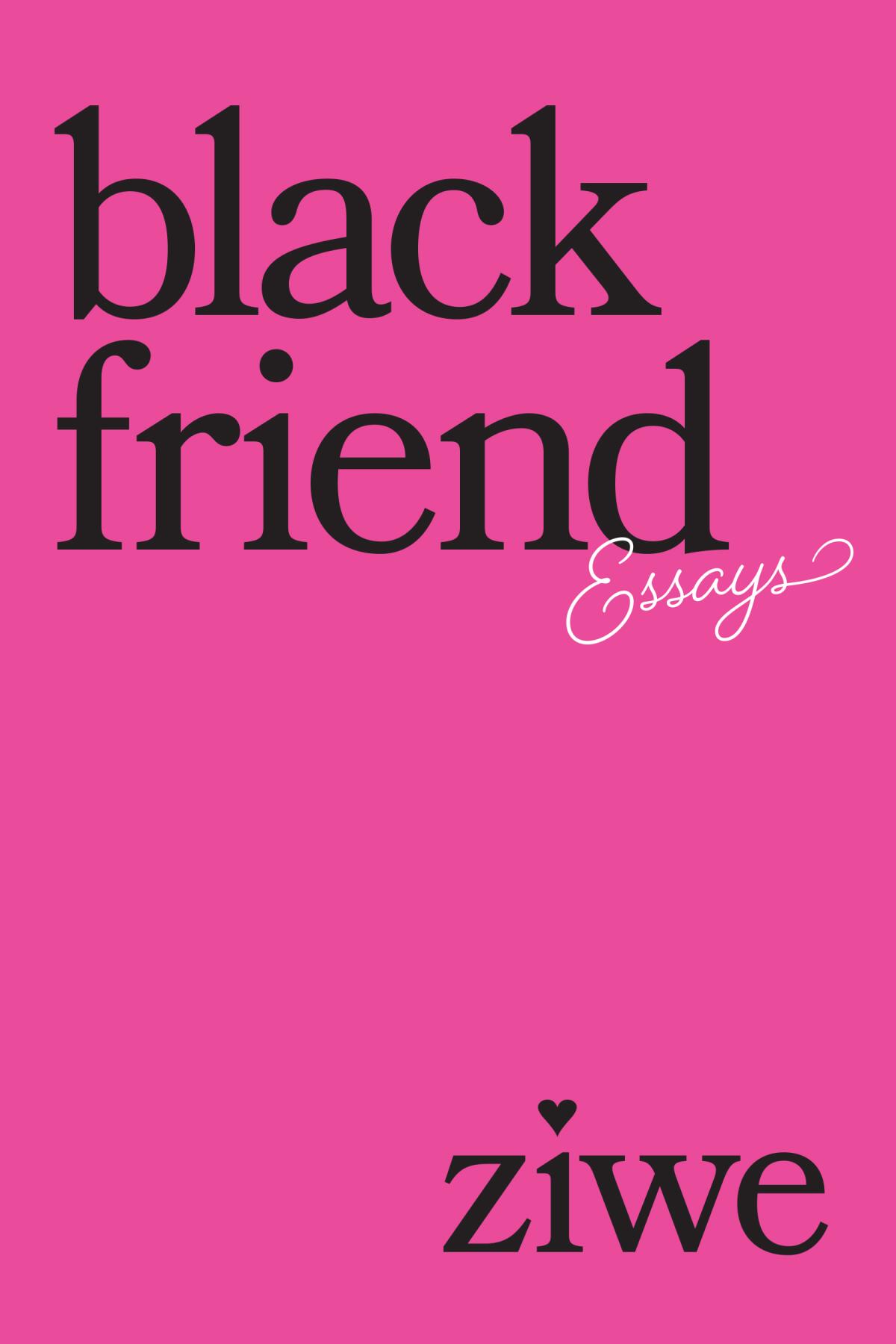
A lot of celebrities turn to memoirs to shape their public narrative. What makes your book of essays different?
I’ve been a professional writer for most of my career. I started in college when I was freelancing at the Onion, and I’ve been doing that still to this day. So I don’t know if I am necessarily your typical celebrity essayist. As far as my audience is concerned, I can’t control what people take away from my writing. I hope that they find it funny, I hope that they get a sense of the work I put into the stories. Really, all I can do as a writer is sit down and bleed out on the text, and hope my vulnerability is enough to move my audience.
How did you decide on the title of your book?
I think there are many essays that circle around being a Black friend, and Black friendship, and [also] being part of like a community of Black friends. … [And] in the introduction, I write about the Black friend being the omnipresent figure in American media who never has a chance to explore their own journey. In this Black friend’s world they are the protagonists, but they always appear like a sidekick.
There is obviously a connection to the question I asked on Instagram Live. I had no idea that that would be the breakout question of the show. I don’t even think that was the funniest question. But it somehow became a calling card, which I found to be very interesting. Like, nobody knows my name. I am the Black friend brought to this WNBA game being misidentified, and the Black friend being [briefly] barred from a screening of “If Beale Street Could Talk.”
Battered by scandal, “The Ellen DeGeneres Show” ends its 19-year run on Thursday. Its host is no longer the queer celebrity we can all agree on.
You — or your character — ask some hilariously inappropriate personal questions in the show. What was it like to ask yourself the uncomfortable questions?
I didn’t want to share one iota about myself. I don’t want people to know where I live, what I eat, that I have a pet. That is not my instinct from a cultural perspective. And also from an artistic perspective, I find that there is more freedom and being able to hide behind a character — and then they have a really clear point of view. When you’re just yourself, you don’t want to offend anyone. I don’t want to misspeak. But comedy lives on that dangerous ledge.
In your book, you compare your performance on your show to drag. Can you talk more about how you craft your persona?
The space of late-night television and broadcast news is really masculine. It’s a lot of suits. And I was thinking, what is the antithetical to that? Mind you, women’s talk shows are packaged so differently: They’re daytime, there’s a cooking segment and there’s fashion shows at lunch. So I pulled from the daytime world. I also played with Barbies and Bratz dolls as a kid. I was attracted to that world as a child because that’s what I saw as the emblem of femininity. I wanted to have this plastic toy in my hand, even though it couldn’t breathe and it didn’t have any genitals.
I wonder about that persona and how much it’s bled into your personal life. You’ve said that when strangers meet you, they expect you to be aggressive and mean.
I think people are terrified of me. That’s just the truth. I hate it. I was about to say that nobody wants people to be afraid of them. But there’s obviously that famous quote, “It’s better to be feared than loved.” But I would rather be loved. I don’t love that at all.
You insert a lot of sidebars and footnotes to add context to the narrative. Why did you choose that format?
I think my mind is sort of manic in the way that I wrote my book. And so in “The Brief Wondrous Life of Oscar Wao”, which is probably my biggest influence as far as the footnotes go, [Junot Diaz] told multiple stories concurrently over the course of his book. And similarly, I was interested in having people follow my train of thought, but also including like, OK, this is the historical context as I talk about how I’m the Rosa Parks of a free screening of a movie. So it was just part of it was just like, yeah, it was an artistic choice that I, that reflects how my mind works.
Ben Philippe pitched “Sure, I’ll Be Your Black Friend” as a humorous guide. But as the world changed, he allowed himself to explore his own anger.
You’ve been characterized before as an agent of chaos. Do you identify with that?
No, I don’t have it on my CV, although maybe I should add it. Honestly, I thrive much like Bane. I thrive in the chaos. It’s something that I am really comfortable with. I did an episode of [Andy Cohen’s] “Watch What Happens Live” yesterday with Mary Cosby, this famously chaotic character in “The Real Housewives of Salt Lake City.” And unfortunately, or fortunately, I found myself really at peace. So I just take chaos — better than the average duck. But I wouldn’t say that’s my job.
What do you consider the responsibility of your platform then? In your book you cite the work of a lot of thinkers, including James Baldwin and W.E.B. Du Bois. But of yourself you write, “I am a well-spoken, attractive person so my job is to be hot and loudly repeat things that smarter people say.”
I think my only responsibility is to be funny. That’s my job. I’m a comedian and the reaction I’m supposed to get is, “Ha ha ha, ha ha, ha.” Everything else is gravy, it is an elective surgery. I’m not an activist, I cannot speak to the proper ways to mobilize. I create entertaining content that makes people think. My impact is Ziwe. My title is Ziwe. My job is Ziwe and I’m really good at it.
More to Read
Sign up for our Book Club newsletter
Get the latest news, events and more from the Los Angeles Times Book Club, and help us get L.A. reading and talking.
You may occasionally receive promotional content from the Los Angeles Times.
